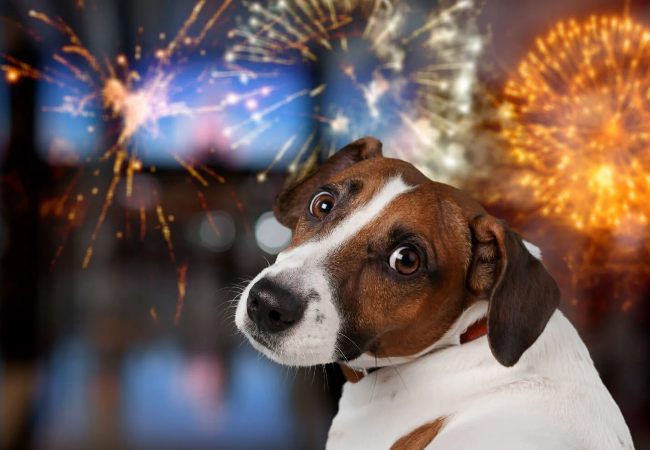A Vet’s Guide to Helping Dogs Scared of Fireworks 2025 🎆🐾

In this article
A Vet’s Guide to Helping Dogs Scared of Fireworks 2025 🎆🐾
By Dr. Duncan Houston BVSc
Hi, I’m Dr Duncan Houston BVSc, veterinarian and founder of Ask A Vet. Fireworks celebrations can be an anxious, even traumatic event for many dogs. In this vet-approved guide, we’ll review why fireworks scare dogs, how to prepare ahead, practical management tips during events, emergency precautions if they escape, and supportive tools—including Ask A Vet telehealth- to keep your pup safe and comforted. 🩺🐾
1. Why Fireworks Terrify Dogs
Dogs experience sounds at higher frequencies and volumes than we do—fireworks can register near 140 dB, comparable to jet engines. Accompanying flashes, smells, and unpredictability trigger flight-or-fight responses, often resulting in pacing, trembling, hiding, or attempts to escape.
2. Signs Your Dog Is Stressed
- 🏃♂️ Pacing, panting, trembling, drooling, whining
- 🚪 Hiding or trying to escape
- 🧩 Restlessness, inability to settle
- 🩺 Physical signs: yawning, lip-licking, dilated pupils
3. Pre-Event Preparation
3.1 Sound Desensitization & Counter-Conditioning
At least 3–6 months before fireworks, use recordings at low volume paired with treats to shift the association. Gradually increase volume as your dog remains calm.
3.2 Safe Haven Creation
- Choose an interior, windowless room (closet, bathroom); close curtains.
3.3 Acclimation to Pressure Wraps and Vests
Introduce life jackets like Thundershirt® gradually so your dog associates it with comfort—not restriction.
3.4 ID & Escape Preparedness
Ensure microchip registry is current, collar ID tags visible. Use secure leashes and fencing; acoustic or scented triggers may cause escapes.
4. Managing Fireworks Night
- 🐾 Keep your dog indoors; do not leave it alone.
- 🔊 Use white noise, fans, TV, or classical playlists like “Through a Dog’s Ear”.
- 🧘♂️ Calm yourself—dogs sense owner stress; speak softly, pet gently.
5. Calming Aids & Medications
5.1 Pheromones & Supplements
Adaptil diffusers, collars, and pheromone sprays can soothe some dogs. Supplements like Zylkene or anti-anxiety treats may offer mild relief—vet consultation advised.
5.2 Pressure Vests
Vest use can help; ensure a snug, comfortable fit validated through trials.
5.3 Prescription Medications
For severe anxiety, talk to your vet about trazodone, clonidine, or benzodiazepines. Administer early and monitor sedation.
6. After the Fireworks
- 🔍 Inspect outside areas for firework debris—ingestion can be toxic and dangerous.
- 🧼 Clean up debris before letting your dog outdoors.
- 🩺 If panic behavior persists, reach out for continued support via Ask A Vet telehealth.
7. Emergency & Safety Planning
- 📱 Have microchip companies and vet clinic info handy.
- 🔔 Use GPS trackers or loud call routines in case of escape.
- 🤕 Ensure broken glass or barked paws are checked promptly.
8. Tools to Support Calm
- Ask A Vet App: Telehealth consultations, prescription support, and follow-up system help.
9. Case Study – Leo’s Night
Case: Leo, a 4-year-old mixed breed
Leo panicked every July 4th—trembling and escaping. This year, his family started six weeks early with desensitization sounds and treats, created a cozy safe zone with his crate, equipped him with ThunderShirt, and set up fans and soothing classical music. On the event night, Leo remained relaxed. His owner confirmed he was calmer and happier than ever.
10. Long-Term Behavioral Health
- 🧠 Ongoing desensitization year-round minimizes reset trauma.
- 👂 Monitor signs—lip licking, pacing—for early intervention.
- 📆 Schedule yearly check-ins with behaviour-savvy vets or authorised behaviourists.
📌 Final Thoughts from a Vet
Firework seasons can severely challenge your dog's emotional wellness. But with advance preparation—safe spaces, sound and scent distractions, training, and the right calming aids—you can help them feel safe and secure. And if anxiety is severe, medications or a behaviorist’s plan can help rebuild trust and reduce fear long-term. Ask A Vet,🐾❤️






